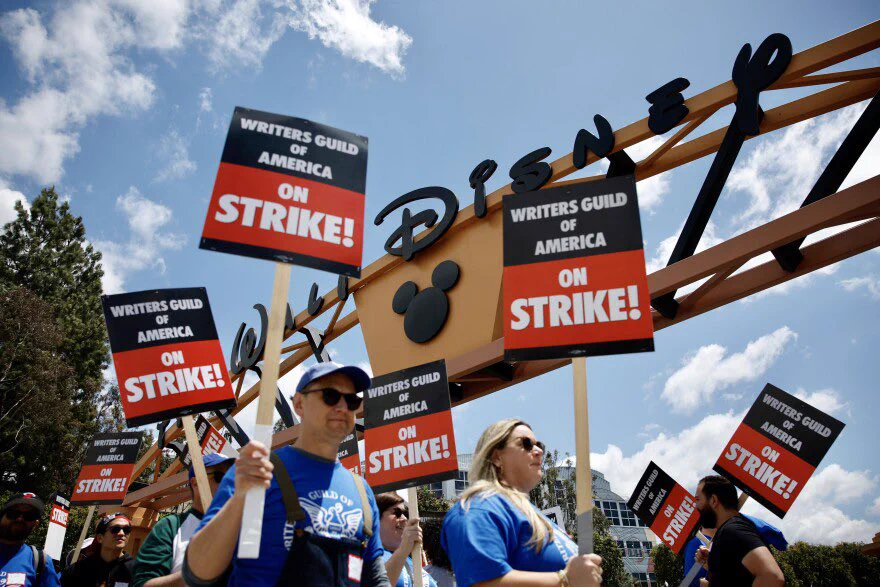Hollywood is bleeding, and bigwig executives are to blame for the current writers strike that will cost studios an estimated $5 billion in revenue. One of longest labor strikes in the history of Hollywood, the Writers Guild of America (WGA) is nearing its 140th day on strike, and there are not enough empty award ceremonies to remedy the tension between writers and studios. On May 2 of this year, members of the WGA voted to go on strike to demand better compensation, arguing the current contract negotiated between the WGA and Hollywood studios does not adequately reflect the current landscape of digital entertainment. Additionally, not only are writers on strike, but actors who are members of the Screen Actors Guild – American Federation of Television and Radio Artists (SAG-AFTRA) have also gone on strike as of July 13. The obvious catalyst of the strikes is pay, but the last time writers and actors were on strike together was in 1960, so why now?
The 1960 strike was a landmark event in the history of Hollywood and entertainment as it laid the foundation for how writers and actors would be compensated in the years to come. Arguably the most notable result of the strike was that writers and actors would now earn residual payments from their projects: a form of passive income generated from reruns of the program on cable television. As the years went on, these residual payments extended past cable television and included a small portion of DVD sales. In the last decade or so, the agreed upon pay structures in the digital media industry have become outdated. The sources of revenue generated by studios have transformed drastically as consumers have shifted from traditional cable television to online streaming services. Consequently, the previously negotiated contracts between Hollywood studios and the labor unions do not include provisions to protect writers and actors working on productions made for streaming services. In prior decades, tenured writers and actors were able to achieve financial security in large part due to the residual payments they received from working on shows and movies that had reruns air on cable networks or from the DVD sales of the production project.
With streaming services, these residual payments are not properly regulated and, as a result, writers and actors working on big-name productions that air directly to streaming services have been given laughable checks that are widely disproportionate to the actual revenue the projects generate. One notable example of this was the measly $27 in residual payments Kimiko Glenn received over the last decade from her role on Netflix’s hit television show, “Orange is the New Black.” To put that number into perspective, in July 2019, Netflix tweeted, “105m households have watched at least one episode of OITNB [Orange is the New Black]. It’s our most-watched original ever.” Despite the enormous success of this show and other streaming shows alike, actors and writers typically receive the largest stake of their profits during the actual stages of production. Regardless of Glenn’s lack of compensation for her major role in the production of “Orange is the New Black,” for some, international fame and notoriety is a worthy supplement for the wages she could have earned.
To those few, you are wrong. To explain why, it’s easiest to describe the way the digital entertainment industry works in the context of an entry-level corporate sales job. As an employee in sales, one’s salary is typically predicated on commission, so being the one to finalize the sale matters. Now, say the boss comes in and says the entirety of commissions generated from the new online sales platform will be given to the top few sales employees, but otherwise, everyone else’s salaries will remain the same. That is basically what the top Hollywood executives did when they shifted to a more streaming-centric approach to producing shows and movies. Reports published by Variety show that Hollywood executives have been making outrageously disproportionate salaries to the writers they employ. According to the report, the two co-CEOs of Netflix, Ted Sarandos and Reed Hastings, reported over $100 million in earnings in 2022. In comparison, the combined salaries of over 458 average employees at Netflix makes just slightly less than the two executives. The pay structure in the streaming entertainment industry is basically the same as if the owner of the Golden State Warriors made significantly more than Stephen Curry, their star player. It is ironic that an industry formulated around creativity and artistic expression regularly undervalues the creatives it employees.
The significance of the union strikes in Hollywood is far greater than just whether or not the production of “Dune 2” will be pushed back. The predatory practices of Hollywood executives in the entertainment industry are as old as the industry itself to the point where it is easy to forget that without the writer and actor, there would be no show or movie at all. The WGA and SAG-AFTRA strikes are empowering to not just current actors and writers, but aspiring creatives as well.
Zachary Badalamenti, FCRH ’25, is a journalism major from Oakland, Calif.















































































































































































































